Analysis of HSBC's Hybrid Mode: Leadership, Performance, and Finance
VerifiedAdded on 2022/03/10
|5
|1777
|27
Report
AI Summary
This report provides a critical analysis of HSBC's operations in a hybrid mode, focusing on sustainable leadership initiatives designed to improve operational management and enhance productivity and performance, with a specific emphasis on financial performance and people management. The report utilizes the HSBC case study, incorporating information from the Pilot's book, journal articles, and Bloomberg reports to evaluate the challenges and opportunities presented by hybrid working. It examines the financial performance of HSBC, including the impact of the hybrid model on its various business segments, and explores leadership and corporate governance within the banking sector. Furthermore, the report investigates the impact of diversity and inclusion on organizational structure, and reviews the challenges HSBC faces, such as top leadership changes, hierarchical governance, and global restructuring efforts. The analysis includes the bank's plans for a permanent hybrid work model, and its potential implications on the business. The report concludes by summarizing the key findings and providing recommendations for improving operational efficiency and employee engagement in a hybrid work environment.
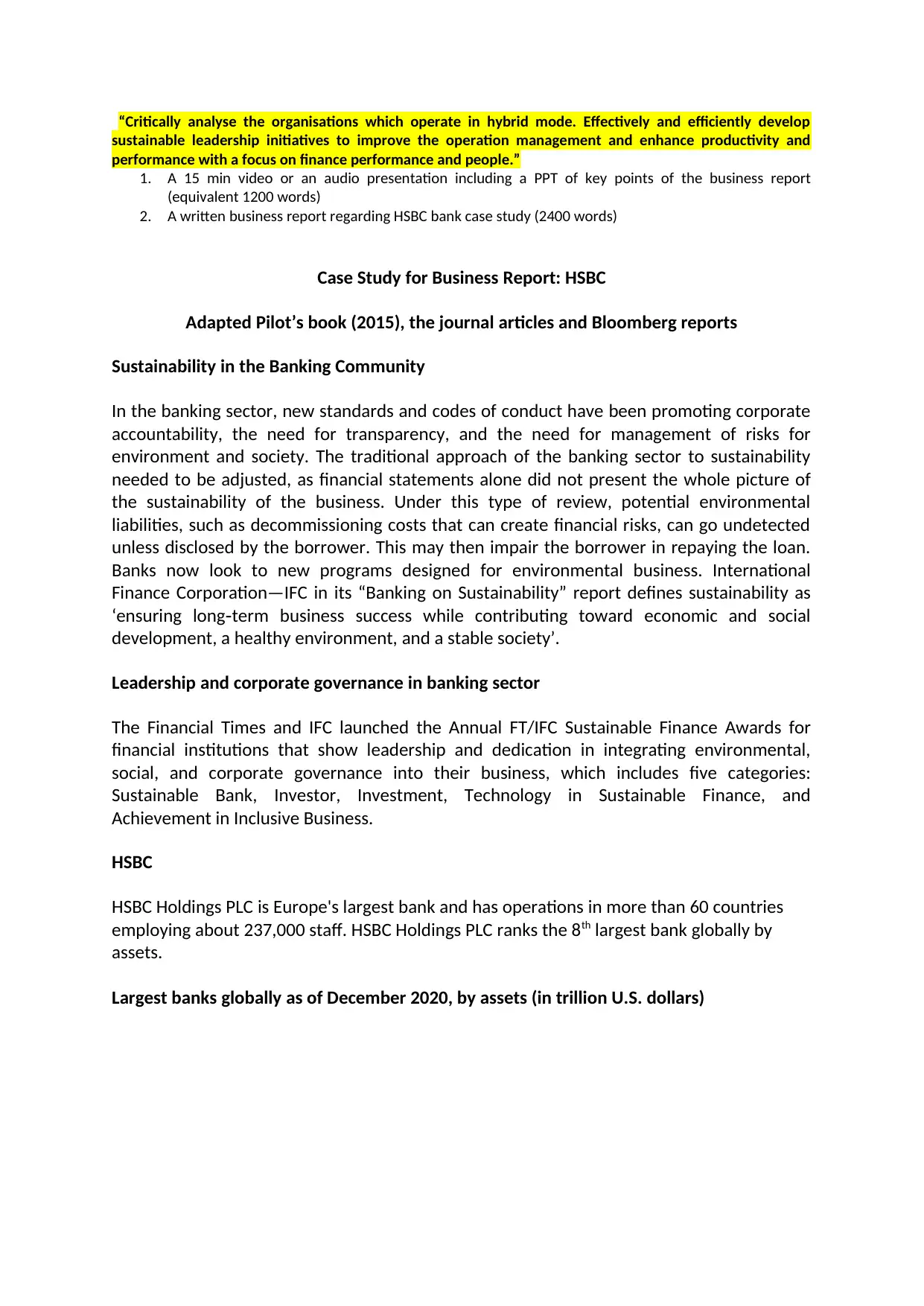
“Critically analyse the organisations which operate in hybrid mode. Effectively and efficiently develop
sustainable leadership initiatives to improve the operation management and enhance productivity and
performance with a focus on finance performance and people.”
1. A 15 min video or an audio presentation including a PPT of key points of the business report
(equivalent 1200 words)
2. A written business report regarding HSBC bank case study (2400 words)
Case Study for Business Report: HSBC
Adapted Pilot’s book (2015), the journal articles and Bloomberg reports
Sustainability in the Banking Community
In the banking sector, new standards and codes of conduct have been promoting corporate
accountability, the need for transparency, and the need for management of risks for
environment and society. The traditional approach of the banking sector to sustainability
needed to be adjusted, as financial statements alone did not present the whole picture of
the sustainability of the business. Under this type of review, potential environmental
liabilities, such as decommissioning costs that can create financial risks, can go undetected
unless disclosed by the borrower. This may then impair the borrower in repaying the loan.
Banks now look to new programs designed for environmental business. International
Finance Corporation—IFC in its “Banking on Sustainability” report defines sustainability as
‘ensuring long term business success while contributing toward economic and social‐
development, a healthy environment, and a stable society’.
Leadership and corporate governance in banking sector
The Financial Times and IFC launched the Annual FT/IFC Sustainable Finance Awards for
financial institutions that show leadership and dedication in integrating environmental,
social, and corporate governance into their business, which includes five categories:
Sustainable Bank, Investor, Investment, Technology in Sustainable Finance, and
Achievement in Inclusive Business.
HSBC
HSBC Holdings PLC is Europe's largest bank and has operations in more than 60 countries
employing about 237,000 staff. HSBC Holdings PLC ranks the 8th largest bank globally by
assets.
Largest banks globally as of December 2020, by assets (in trillion U.S. dollars)
sustainable leadership initiatives to improve the operation management and enhance productivity and
performance with a focus on finance performance and people.”
1. A 15 min video or an audio presentation including a PPT of key points of the business report
(equivalent 1200 words)
2. A written business report regarding HSBC bank case study (2400 words)
Case Study for Business Report: HSBC
Adapted Pilot’s book (2015), the journal articles and Bloomberg reports
Sustainability in the Banking Community
In the banking sector, new standards and codes of conduct have been promoting corporate
accountability, the need for transparency, and the need for management of risks for
environment and society. The traditional approach of the banking sector to sustainability
needed to be adjusted, as financial statements alone did not present the whole picture of
the sustainability of the business. Under this type of review, potential environmental
liabilities, such as decommissioning costs that can create financial risks, can go undetected
unless disclosed by the borrower. This may then impair the borrower in repaying the loan.
Banks now look to new programs designed for environmental business. International
Finance Corporation—IFC in its “Banking on Sustainability” report defines sustainability as
‘ensuring long term business success while contributing toward economic and social‐
development, a healthy environment, and a stable society’.
Leadership and corporate governance in banking sector
The Financial Times and IFC launched the Annual FT/IFC Sustainable Finance Awards for
financial institutions that show leadership and dedication in integrating environmental,
social, and corporate governance into their business, which includes five categories:
Sustainable Bank, Investor, Investment, Technology in Sustainable Finance, and
Achievement in Inclusive Business.
HSBC
HSBC Holdings PLC is Europe's largest bank and has operations in more than 60 countries
employing about 237,000 staff. HSBC Holdings PLC ranks the 8th largest bank globally by
assets.
Largest banks globally as of December 2020, by assets (in trillion U.S. dollars)
Paraphrase This Document
Need a fresh take? Get an instant paraphrase of this document with our AI Paraphraser
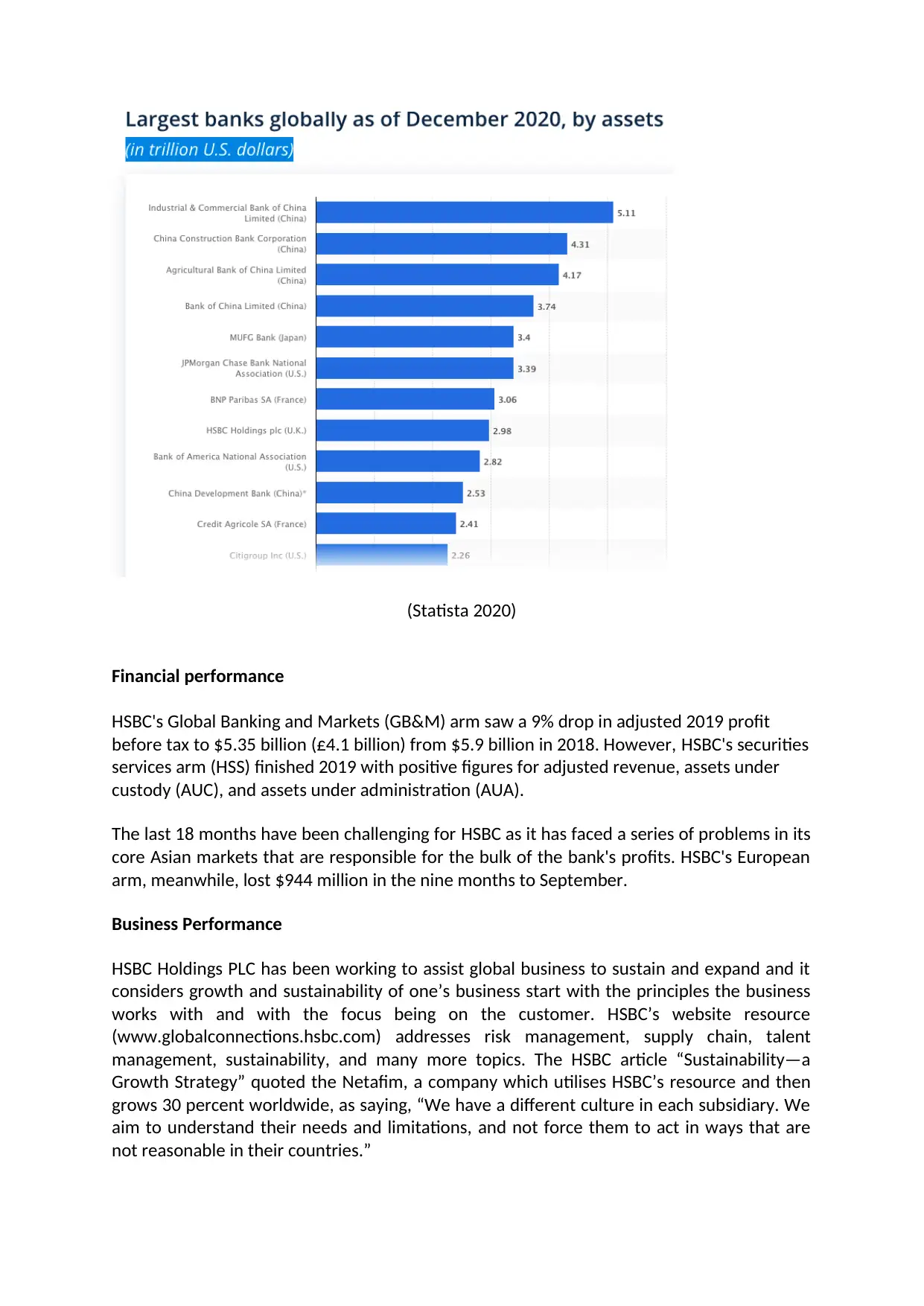
(Statista 2020)
Financial performance
HSBC's Global Banking and Markets (GB&M) arm saw a 9% drop in adjusted 2019 profit
before tax to $5.35 billion (£4.1 billion) from $5.9 billion in 2018. However, HSBC's securities
services arm (HSS) finished 2019 with positive figures for adjusted revenue, assets under
custody (AUC), and assets under administration (AUA).
The last 18 months have been challenging for HSBC as it has faced a series of problems in its
core Asian markets that are responsible for the bulk of the bank's profits. HSBC's European
arm, meanwhile, lost $944 million in the nine months to September.
Business Performance
HSBC Holdings PLC has been working to assist global business to sustain and expand and it
considers growth and sustainability of one’s business start with the principles the business
works with and with the focus being on the customer. HSBC’s website resource
(www.globalconnections.hsbc.com) addresses risk management, supply chain, talent
management, sustainability, and many more topics. The HSBC article “Sustainability—a
Growth Strategy” quoted the Netafim, a company which utilises HSBC’s resource and then
grows 30 percent worldwide, as saying, “We have a different culture in each subsidiary. We
aim to understand their needs and limitations, and not force them to act in ways that are
not reasonable in their countries.”
Financial performance
HSBC's Global Banking and Markets (GB&M) arm saw a 9% drop in adjusted 2019 profit
before tax to $5.35 billion (£4.1 billion) from $5.9 billion in 2018. However, HSBC's securities
services arm (HSS) finished 2019 with positive figures for adjusted revenue, assets under
custody (AUC), and assets under administration (AUA).
The last 18 months have been challenging for HSBC as it has faced a series of problems in its
core Asian markets that are responsible for the bulk of the bank's profits. HSBC's European
arm, meanwhile, lost $944 million in the nine months to September.
Business Performance
HSBC Holdings PLC has been working to assist global business to sustain and expand and it
considers growth and sustainability of one’s business start with the principles the business
works with and with the focus being on the customer. HSBC’s website resource
(www.globalconnections.hsbc.com) addresses risk management, supply chain, talent
management, sustainability, and many more topics. The HSBC article “Sustainability—a
Growth Strategy” quoted the Netafim, a company which utilises HSBC’s resource and then
grows 30 percent worldwide, as saying, “We have a different culture in each subsidiary. We
aim to understand their needs and limitations, and not force them to act in ways that are
not reasonable in their countries.”
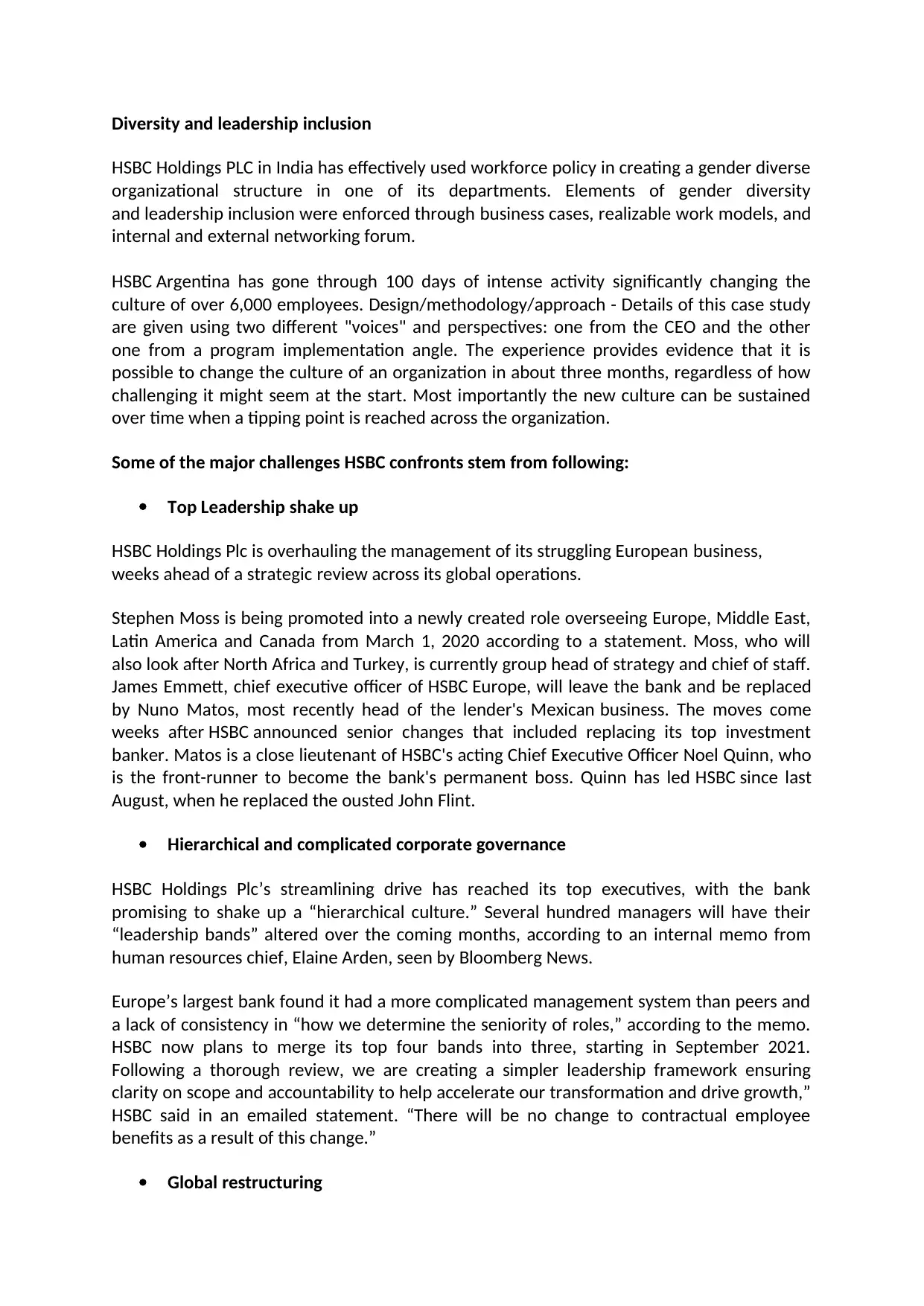
Diversity and leadership inclusion
HSBC Holdings PLC in India has effectively used workforce policy in creating a gender diverse
organizational structure in one of its departments. Elements of gender diversity
and leadership inclusion were enforced through business cases, realizable work models, and
internal and external networking forum.
HSBC Argentina has gone through 100 days of intense activity significantly changing the
culture of over 6,000 employees. Design/methodology/approach - Details of this case study
are given using two different "voices" and perspectives: one from the CEO and the other
one from a program implementation angle. The experience provides evidence that it is
possible to change the culture of an organization in about three months, regardless of how
challenging it might seem at the start. Most importantly the new culture can be sustained
over time when a tipping point is reached across the organization.
Some of the major challenges HSBC confronts stem from following:
Top Leadership shake up
HSBC Holdings Plc is overhauling the management of its struggling European business,
weeks ahead of a strategic review across its global operations.
Stephen Moss is being promoted into a newly created role overseeing Europe, Middle East,
Latin America and Canada from March 1, 2020 according to a statement. Moss, who will
also look after North Africa and Turkey, is currently group head of strategy and chief of staff.
James Emmett, chief executive officer of HSBC Europe, will leave the bank and be replaced
by Nuno Matos, most recently head of the lender's Mexican business. The moves come
weeks after HSBC announced senior changes that included replacing its top investment
banker. Matos is a close lieutenant of HSBC's acting Chief Executive Officer Noel Quinn, who
is the front-runner to become the bank's permanent boss. Quinn has led HSBC since last
August, when he replaced the ousted John Flint.
Hierarchical and complicated corporate governance
HSBC Holdings Plc’s streamlining drive has reached its top executives, with the bank
promising to shake up a “hierarchical culture.” Several hundred managers will have their
“leadership bands” altered over the coming months, according to an internal memo from
human resources chief, Elaine Arden, seen by Bloomberg News.
Europe’s largest bank found it had a more complicated management system than peers and
a lack of consistency in “how we determine the seniority of roles,” according to the memo.
HSBC now plans to merge its top four bands into three, starting in September 2021.
Following a thorough review, we are creating a simpler leadership framework ensuring
clarity on scope and accountability to help accelerate our transformation and drive growth,”
HSBC said in an emailed statement. “There will be no change to contractual employee
benefits as a result of this change.”
Global restructuring
HSBC Holdings PLC in India has effectively used workforce policy in creating a gender diverse
organizational structure in one of its departments. Elements of gender diversity
and leadership inclusion were enforced through business cases, realizable work models, and
internal and external networking forum.
HSBC Argentina has gone through 100 days of intense activity significantly changing the
culture of over 6,000 employees. Design/methodology/approach - Details of this case study
are given using two different "voices" and perspectives: one from the CEO and the other
one from a program implementation angle. The experience provides evidence that it is
possible to change the culture of an organization in about three months, regardless of how
challenging it might seem at the start. Most importantly the new culture can be sustained
over time when a tipping point is reached across the organization.
Some of the major challenges HSBC confronts stem from following:
Top Leadership shake up
HSBC Holdings Plc is overhauling the management of its struggling European business,
weeks ahead of a strategic review across its global operations.
Stephen Moss is being promoted into a newly created role overseeing Europe, Middle East,
Latin America and Canada from March 1, 2020 according to a statement. Moss, who will
also look after North Africa and Turkey, is currently group head of strategy and chief of staff.
James Emmett, chief executive officer of HSBC Europe, will leave the bank and be replaced
by Nuno Matos, most recently head of the lender's Mexican business. The moves come
weeks after HSBC announced senior changes that included replacing its top investment
banker. Matos is a close lieutenant of HSBC's acting Chief Executive Officer Noel Quinn, who
is the front-runner to become the bank's permanent boss. Quinn has led HSBC since last
August, when he replaced the ousted John Flint.
Hierarchical and complicated corporate governance
HSBC Holdings Plc’s streamlining drive has reached its top executives, with the bank
promising to shake up a “hierarchical culture.” Several hundred managers will have their
“leadership bands” altered over the coming months, according to an internal memo from
human resources chief, Elaine Arden, seen by Bloomberg News.
Europe’s largest bank found it had a more complicated management system than peers and
a lack of consistency in “how we determine the seniority of roles,” according to the memo.
HSBC now plans to merge its top four bands into three, starting in September 2021.
Following a thorough review, we are creating a simpler leadership framework ensuring
clarity on scope and accountability to help accelerate our transformation and drive growth,”
HSBC said in an emailed statement. “There will be no change to contractual employee
benefits as a result of this change.”
Global restructuring
⊘ This is a preview!⊘
Do you want full access?
Subscribe today to unlock all pages.

Trusted by 1+ million students worldwide
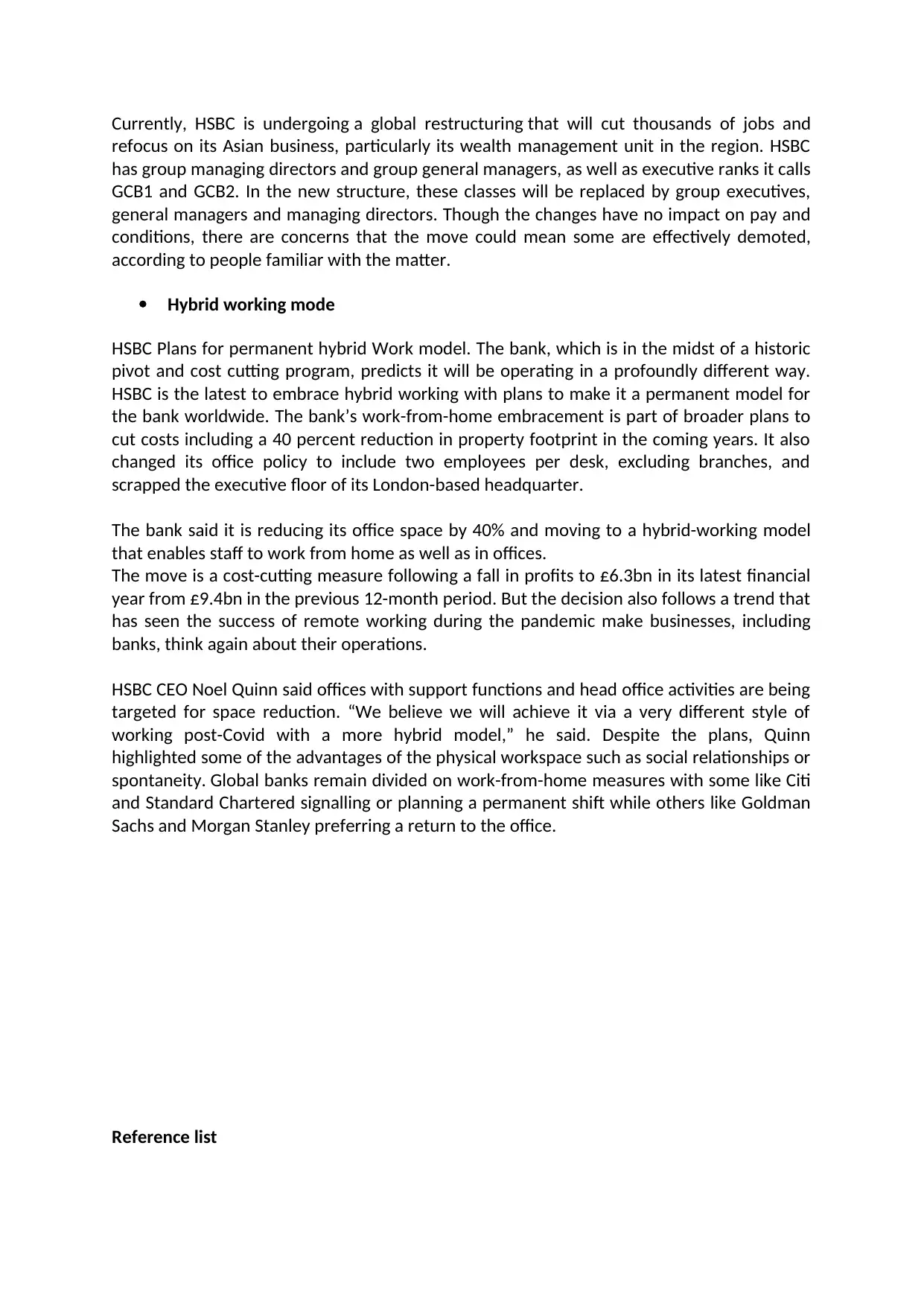
Currently, HSBC is undergoing a global restructuring that will cut thousands of jobs and
refocus on its Asian business, particularly its wealth management unit in the region. HSBC
has group managing directors and group general managers, as well as executive ranks it calls
GCB1 and GCB2. In the new structure, these classes will be replaced by group executives,
general managers and managing directors. Though the changes have no impact on pay and
conditions, there are concerns that the move could mean some are effectively demoted,
according to people familiar with the matter.
Hybrid working mode
HSBC Plans for permanent hybrid Work model. The bank, which is in the midst of a historic
pivot and cost cutting program, predicts it will be operating in a profoundly different way.
HSBC is the latest to embrace hybrid working with plans to make it a permanent model for
the bank worldwide. The bank’s work-from-home embracement is part of broader plans to
cut costs including a 40 percent reduction in property footprint in the coming years. It also
changed its office policy to include two employees per desk, excluding branches, and
scrapped the executive floor of its London-based headquarter.
The bank said it is reducing its office space by 40% and moving to a hybrid-working model
that enables staff to work from home as well as in offices.
The move is a cost-cutting measure following a fall in profits to £6.3bn in its latest financial
year from £9.4bn in the previous 12-month period. But the decision also follows a trend that
has seen the success of remote working during the pandemic make businesses, including
banks, think again about their operations.
HSBC CEO Noel Quinn said offices with support functions and head office activities are being
targeted for space reduction. “We believe we will achieve it via a very different style of
working post-Covid with a more hybrid model,” he said. Despite the plans, Quinn
highlighted some of the advantages of the physical workspace such as social relationships or
spontaneity. Global banks remain divided on work-from-home measures with some like Citi
and Standard Chartered signalling or planning a permanent shift while others like Goldman
Sachs and Morgan Stanley preferring a return to the office.
Reference list
refocus on its Asian business, particularly its wealth management unit in the region. HSBC
has group managing directors and group general managers, as well as executive ranks it calls
GCB1 and GCB2. In the new structure, these classes will be replaced by group executives,
general managers and managing directors. Though the changes have no impact on pay and
conditions, there are concerns that the move could mean some are effectively demoted,
according to people familiar with the matter.
Hybrid working mode
HSBC Plans for permanent hybrid Work model. The bank, which is in the midst of a historic
pivot and cost cutting program, predicts it will be operating in a profoundly different way.
HSBC is the latest to embrace hybrid working with plans to make it a permanent model for
the bank worldwide. The bank’s work-from-home embracement is part of broader plans to
cut costs including a 40 percent reduction in property footprint in the coming years. It also
changed its office policy to include two employees per desk, excluding branches, and
scrapped the executive floor of its London-based headquarter.
The bank said it is reducing its office space by 40% and moving to a hybrid-working model
that enables staff to work from home as well as in offices.
The move is a cost-cutting measure following a fall in profits to £6.3bn in its latest financial
year from £9.4bn in the previous 12-month period. But the decision also follows a trend that
has seen the success of remote working during the pandemic make businesses, including
banks, think again about their operations.
HSBC CEO Noel Quinn said offices with support functions and head office activities are being
targeted for space reduction. “We believe we will achieve it via a very different style of
working post-Covid with a more hybrid model,” he said. Despite the plans, Quinn
highlighted some of the advantages of the physical workspace such as social relationships or
spontaneity. Global banks remain divided on work-from-home measures with some like Citi
and Standard Chartered signalling or planning a permanent shift while others like Goldman
Sachs and Morgan Stanley preferring a return to the office.
Reference list
Paraphrase This Document
Need a fresh take? Get an instant paraphrase of this document with our AI Paraphraser
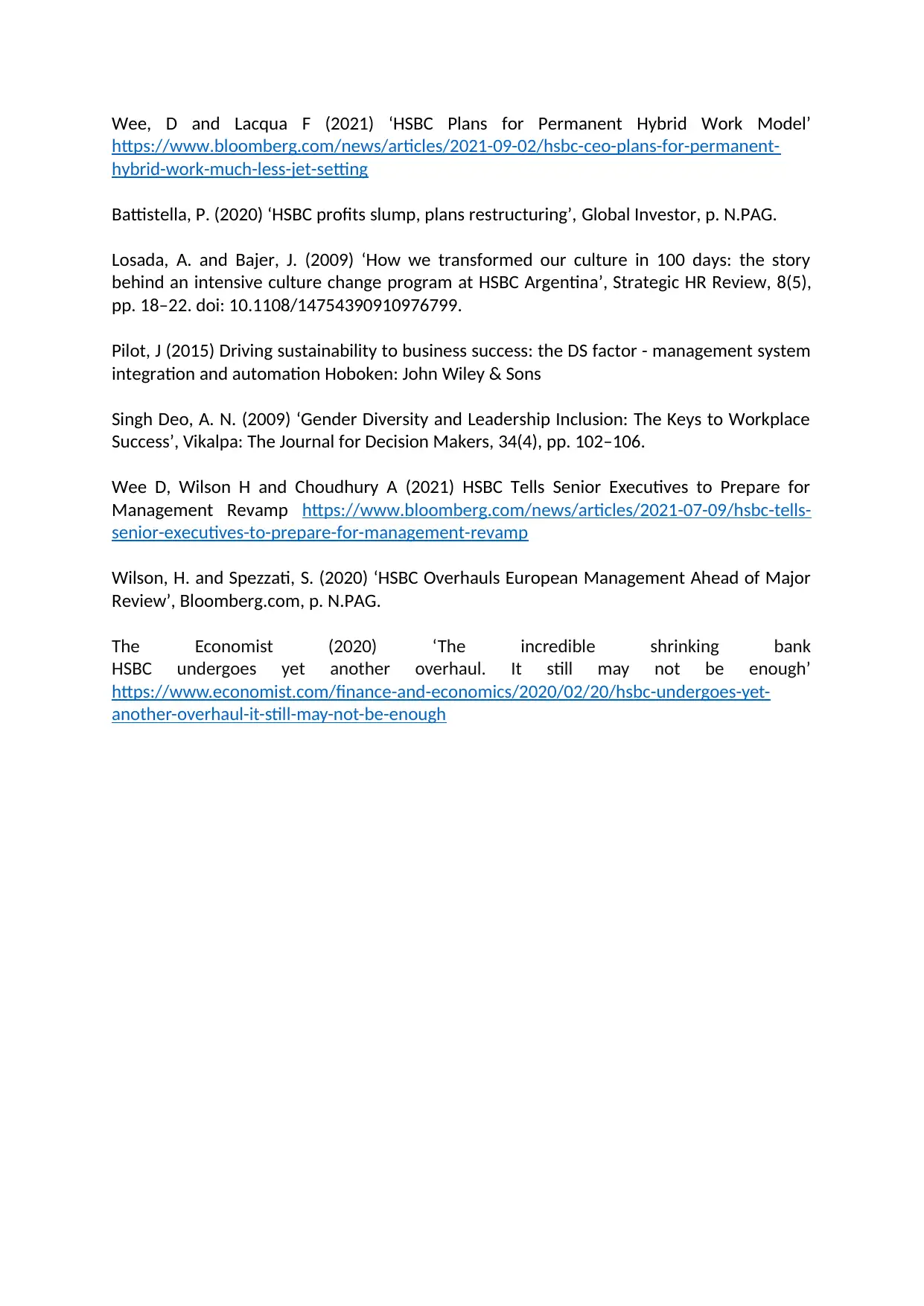
Wee, D and Lacqua F (2021) ‘HSBC Plans for Permanent Hybrid Work Model’
https://www.bloomberg.com/news/articles/2021-09-02/hsbc-ceo-plans-for-permanent-
hybrid-work-much-less-jet-setting
Battistella, P. (2020) ‘HSBC profits slump, plans restructuring’, Global Investor, p. N.PAG.
Losada, A. and Bajer, J. (2009) ‘How we transformed our culture in 100 days: the story
behind an intensive culture change program at HSBC Argentina’, Strategic HR Review, 8(5),
pp. 18–22. doi: 10.1108/14754390910976799.
Pilot, J (2015) Driving sustainability to business success: the DS factor - management system
integration and automation Hoboken: John Wiley & Sons
Singh Deo, A. N. (2009) ‘Gender Diversity and Leadership Inclusion: The Keys to Workplace
Success’, Vikalpa: The Journal for Decision Makers, 34(4), pp. 102–106.
Wee D, Wilson H and Choudhury A (2021) HSBC Tells Senior Executives to Prepare for
Management Revamp https://www.bloomberg.com/news/articles/2021-07-09/hsbc-tells-
senior-executives-to-prepare-for-management-revamp
Wilson, H. and Spezzati, S. (2020) ‘HSBC Overhauls European Management Ahead of Major
Review’, Bloomberg.com, p. N.PAG.
The Economist (2020) ‘The incredible shrinking bank
HSBC undergoes yet another overhaul. It still may not be enough’
https://www.economist.com/finance-and-economics/2020/02/20/hsbc-undergoes-yet-
another-overhaul-it-still-may-not-be-enough
https://www.bloomberg.com/news/articles/2021-09-02/hsbc-ceo-plans-for-permanent-
hybrid-work-much-less-jet-setting
Battistella, P. (2020) ‘HSBC profits slump, plans restructuring’, Global Investor, p. N.PAG.
Losada, A. and Bajer, J. (2009) ‘How we transformed our culture in 100 days: the story
behind an intensive culture change program at HSBC Argentina’, Strategic HR Review, 8(5),
pp. 18–22. doi: 10.1108/14754390910976799.
Pilot, J (2015) Driving sustainability to business success: the DS factor - management system
integration and automation Hoboken: John Wiley & Sons
Singh Deo, A. N. (2009) ‘Gender Diversity and Leadership Inclusion: The Keys to Workplace
Success’, Vikalpa: The Journal for Decision Makers, 34(4), pp. 102–106.
Wee D, Wilson H and Choudhury A (2021) HSBC Tells Senior Executives to Prepare for
Management Revamp https://www.bloomberg.com/news/articles/2021-07-09/hsbc-tells-
senior-executives-to-prepare-for-management-revamp
Wilson, H. and Spezzati, S. (2020) ‘HSBC Overhauls European Management Ahead of Major
Review’, Bloomberg.com, p. N.PAG.
The Economist (2020) ‘The incredible shrinking bank
HSBC undergoes yet another overhaul. It still may not be enough’
https://www.economist.com/finance-and-economics/2020/02/20/hsbc-undergoes-yet-
another-overhaul-it-still-may-not-be-enough
1 out of 5
Related Documents
Your All-in-One AI-Powered Toolkit for Academic Success.
+13062052269
info@desklib.com
Available 24*7 on WhatsApp / Email
![[object Object]](/_next/static/media/star-bottom.7253800d.svg)
Unlock your academic potential
Copyright © 2020–2026 A2Z Services. All Rights Reserved. Developed and managed by ZUCOL.





